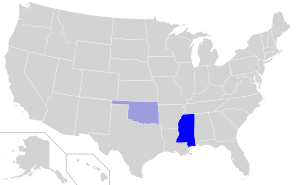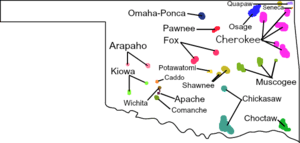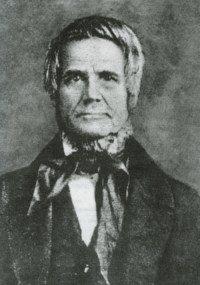Choctaw language facts for kids
Quick facts for kids Choctaw |
||||
|---|---|---|---|---|
| Chahta or Chahta Anumpa | ||||
| Native to | United States | |||
| Region | from Southeastern Oklahoma, to east central Mississippi and into Louisiana and Tennessee | |||
| Ethnicity | 20,000 Choctaw (2007) | |||
| Native speakers | 9,600 (2015 census)e21 | |||
| Language family |
Muskogean
|
|||
| Official status | ||||
| Official language in | ||||

Current geographic distribution of the Choctaw language
|
||||

Distribution of Native American languages in Oklahoma
|
||||
|
||||
The Choctaw language (called Chahta Anumpa in Choctaw) is spoken by the Choctaw people. They are an Indigenous people of the Southeastern Woodlands in North America. This language belongs to the Muskogean language family. The Chickasaw language is very similar and closely related to Choctaw.
A new dictionary for the Choctaw language was published in 2016.
Contents
Writing the Choctaw Language
The written Choctaw language uses letters from the English alphabet. This writing system was developed in the early 1800s. It was part of a program by the United States to help Native American groups, including the Choctaw, learn new ways of life.
There are a few different ways to write Choctaw. The three most common are the Byington (Traditional), Byington/Swanton (Linguistic), and Modern (Mississippi Choctaw) alphabets.
Some experts who study the Choctaw language use a slightly different "modern" spelling. In their version, long vowels are written by doubling the letter. For example, "aa" instead of "a".
Choctaw Language Sounds
This section explains the sounds used in the Choctaw language.
Consonant Sounds
Choctaw has many consonant sounds, similar to English, but also some unique ones.
| Lip Sounds | Tongue-to-Ridge Sounds | Palate Sounds | Back-of-Mouth Sounds | Throat Sounds | ||
|---|---|---|---|---|---|---|
| middle | side | |||||
| Nasal | m | n | ||||
| Stop | p b | t | k | ʔ | ||
| Affricate | ch [tʃ] | |||||
| Fricative | f | s | ɬ | sh [ʃ] | h | |
| Approximant | l | y [j] | w | |||
- The only voiced stop sound is /b/. Voiceless stops like /p/, /t/, and /k/ can sometimes sound partly voiced between vowels.
- The sounds /s/ and /ʃ/ (like "sh" in "shoe") often sound the same at the end of words.
Vowel Sounds
Choctaw has three main vowel sounds: a, i, and o. These can be short, long, or nasal (sounding like they come through the nose).
| Short | Long | Nasal | ||
|---|---|---|---|---|
| tense | lax | |||
| Front | i | ɪ | iː | ĩː~ẽː |
| Back | o | ʊ | oː | õː |
| Central | a | ə | aː | ãː |
- Nasal vowels are naturally long.
Syllable Structure
A syllable is a unit of sound in a word, like "cat" has one syllable, and "wa-ter" has two. In Choctaw, syllables must always have at least one vowel.
- Choctaw words usually do not end or begin with groups of consonants (like "str" in "strong"). There are a few exceptions, especially when certain endings are added.
Different Ways of Speaking Choctaw
There are three main dialects, or regional varieties, of the Choctaw language:
- The "Native" Choctaw spoken in southeastern Oklahoma by the Choctaw Nation of Oklahoma.
- The Choctaw spoken by the Mississippi Band of Choctaw Indians in Oklahoma, near Durwood.
- The Choctaw spoken by the Mississippi Band of Choctaw Indians near Philadelphia, Mississippi.
Some Choctaw speakers also live in Florida, Louisiana, Texas, and California.
How Choctaw Words are Built
Choctaw is an agglutinative language. This means words are often formed by adding many small parts (prefixes and suffixes) to a main word. These parts change the meaning or grammar of the word.
Verbs (Action Words)
Choctaw verbs can have many prefixes (added before the main verb) and suffixes (added after the main verb). These additions tell you who is doing the action, when it happened, and how.
Verb Prefixes
Prefixes on verbs tell us about the people or things involved in the action. They show who is doing the action (the subject) and who or what the action is done to (the object).
- For example, a prefix might show "I" kicked something, or "you" saw someone.
- There are special prefixes for "I," "you," "we," and "you all."
- For "he," "she," "it," or "they," there is often no special prefix.

Verb Suffixes
Suffixes on verbs add more information. They can tell you:
- When something happened (past, future, or general time).
- Baliilih. (run-tense) - 'She runs.'
- Baliilaachi̱h. (run-future-tense) - 'She will run.'
- How you know something (if you saw it yourself, or if you are guessing).
- Nipi' awashlihli. (meat fry-first:hand) - 'She fried the meat.' (I saw her do it.)
- Nipi' awashlitoka̱sha. (meat fry-past-guess) - 'She fried the meat.' (I guess she did.)
- What kind of sentence it is (a question, an exclamation, or a command).
- Awashlitoko̱? (fry-past-question) - 'Did she fry it?'
- Chahta' siahokii! (Choctaw 1sII-be-tense-exclamation) - 'I'm Choctaw!'
Verb Infixes
Infixes are small parts added inside the main verb. They show how the action happens, like if it lasts a long time, repeats, or happens suddenly.
- n-grade: Shows an action lasts for a while.
- hn-grade: Shows an action repeats, like "kept on raining."
- h-grade: Shows a sudden or quick action, like "took a quick nap."
Nouns (Naming Words)
Nouns in Choctaw can also have prefixes and suffixes.
Noun Prefixes
Prefixes on nouns show who owns something.
- sanoshkobo' (my-head) - 'my head'
- chinoshkobo' (your-head) - 'your head'
- noshkobo' (head) - 'his/her/its/their head'
Some nouns, like body parts or family members, always use certain prefixes to show who they belong to. Other nouns use different prefixes.
Noun Suffixes
Suffixes on nouns can tell you if it's "that" thing or "this" thing. They also show the noun's role in the sentence, like if it's the one doing the action (nominative) or the one the action is done to (accusative).
- alla' naknimat (child male-that-nominative) - 'that boy' (the one doing something)
- Hoshiit itti chaahamako̱ o̱biniilih. (bird-nominative tree tall-that-accusative sit-tense) - 'The bird is sitting on that tall tree.' (Not on the short one.)
Word Order in Choctaw
In Choctaw, sentences usually end with the verb (the action word). This is different from English, where the verb is often in the middle.
- o̱batok. (rain-past) - 'It rained.'
- Niyah. (fat-tense) - 'She/he/it is fat.'
If there is a subject (who or what is doing the action), it usually comes before the verb.
- Hoshiyat apatok. (bird-nominative eat-past) - 'The birds ate them.'
Objects (who or what the action is done to) can also come before the verb.
- Hoshiyat sho̱shi(-ya̱) apatok. (bird-nominative bug-accusative eat-past) - 'The birds ate the bugs.'
In phrases, the main word also comes last.
- ofi' hohchifo' (dog name) - 'the dog's name'
- tamaaha' bili̱ka (town near) - 'near a town'
Common Choctaw Words and Phrases
Here are some everyday Choctaw phrases:
- Choctaw: Chahta
- Hello!: Halito!
- See you later!: Chi pisa la chike!
- Thank you: Yakoke
- What is your name?: Chi hohchifo yat nanta?
- My name is...: Sa hohchifo yat...
- Yes: a̱
- No: kíyo
- Okay: ohmi
- I don't understand.: Ak akostiníncho.
- I don't know.: Ak ikháno.
- Do you speak Choctaw?: Chahta imanompa ish anompola hinla ho̱?
- What is that?: Yammat nanta?
Other Choctaw words:
- Cherokee: Chalaki
- Chickasaw: Chickashsha
- Seminole: Siminóli
- Creek/Muskogee: Maskóki
- Today: himak nittak
- Tonight: himak ninak
- Tomorrow: onnakma
- Yesterday: piláshásh
- Month: hashi
- House: chokka
- School: holisso ápisa
- Cat: katos
- Dog: ofi
- Cow: wák
- Horse: issoba/soba
Counting to Twenty
- One: achoffa
- Two: toklo
- Three: tochchína
- Four: oshta
- Five: talhlhapi
- Six: hannali
- Seven: o̱toklo
- Eight: o̱tochchina
- Nine: chakkali
- Ten: pokkoli
- Eleven: awahachoffa
- Twelve: awahtoklo
- Thirteen: awahtochchina
- Fourteen: awahoshta
- Fifteen: awahtalhlhapi
- Sixteen: awahhannali
- Seventeen: awaho̱toklo
- Eighteen: awahuntochchina
- Nineteen: abichakkali
- Twenty: pokkoli toklo
You can find an Online Choctaw Language Tutor with pronunciation help and lessons on Small Talk, Animals, Food, and Numbers at the "Native Nashville" website: [1].
Images for kids
See also
 In Spanish: Idioma choctaw para niños
In Spanish: Idioma choctaw para niños
 | DeHart Hubbard |
 | Wilma Rudolph |
 | Jesse Owens |
 | Jackie Joyner-Kersee |
 | Major Taylor |






